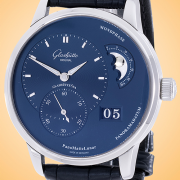|
Glashütte Original PanoMatic Lunar Automatic Men’s Stainless Steel Watch 1-90-02-46-32-55
Model Reference:: 1-90-02-46-32-55
|
|
See details
|
|
Retail Value: $12,400.00
Your Price: $7,800.00
YOU Save 37% |
Founder/Origins: In 1845 Ferdinand Adolph Lange founded the first watch firm in Glashütte, Germany. In 1916 Karl W. Höhnel labeled one of his pendulum clocks “Original Glashütte.” With the fall of the Iron Curtain, the Glashütte Original brand as we know it today emerged.
Country: Germany
History: In 1845 Ferdinand Adolph Lange founded the first watch firm in the Saxon village of Glashütte. Soon after, master craftsmen such as Adolph Schneider and Julius Assmann arrived. Around 1865 precision pocket watches from the area displayed features that would become typical to the brand: the Glashütte three-quarter plate, gold lever wheel and chatons, and a sunburst finish. Instructor Alfred Helwig developed the flying tourbillon in 1920—an important innovation in precision timekeeping. The 1960s saw a wide range of timepieces for men and women with features like shock resistance, date display, and a sweep-seconds hand. With the fall of the Iron Curtain and reunification of Germany, the brand—then known as Glashütte Uhrenbetrieben GmbH—became the legal heir to the formerly independent watch companies still in existence in Glashütte up to 1951. Glashütte Original’s famous PanoDate line features the successful PanoGraph and award-winning PanoRetroGraph timepieces.
Sponsorships/Partnerships: Glashütte Original was an official partner of the 9th Zurich Film Festival. Glashütte Original also teamed up with camera manufacturer Leica for the Beauty of German Art & Innovation celebration.
Ambassadors: Musicians Bruce Springsteen and Eric Singer.
Timeline & Accomplishments:
• 1865 → Signature features of Glashütte Original timepieces emerge.
• 1920 → Instructor Alfred Helwig develops the flying tourbillon.
• 1927 → First appearance of a ladies watch possessing a dial imprinted with “Glashütte Original.”
• 1950 → Glashütte Watch Factories forms through the merger of several watchmaking firms.
• 1960s → Manually wound Calibres 70.1 and 70.3 introduced. Calibres 74 and 75 follow, and the movement of the Spezimatic model is much celebrated.
• 1970s → Production of quartz-controlled marine chronometers.
• 1978 → The Spezichron model is launched and features weekday and date display.
• 1990 → Reunification of Germany and the brand becomes the legal heir to the formerly independent watch companies still in existence in Glashütte up to 1951.
• 2000 → The Glashütte Original brand is purchased by the Swatch Group.
• 2001 → Glashütte Original Alfred Helwig School of Watchmaking opens.
• 2008 → Inauguration of German Watch Museum Glashütte.
• 2012 → The Grande Cosmopolite Tourbillon, an extremely sophisticated timepiece, is produced.


 Company Details
Company Details
